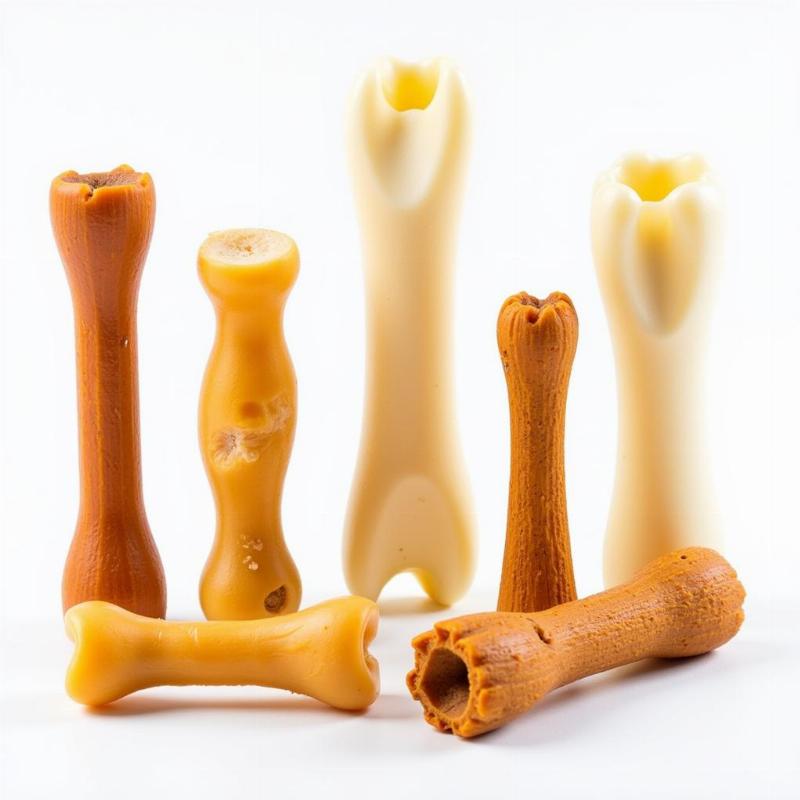Choosing the right chew for your dog can be a challenge. You want something they’ll enjoy, but more importantly, something that’s safe. Splintering dog bones pose a serious health risk, potentially causing choking, internal punctures, and digestive issues. So, how do you find dog bones that don’t splinter and provide hours of safe chewing enjoyment? This comprehensive guide explores the best options available in the US, ensuring your furry friend stays happy and healthy.
Many dog owners are understandably concerned about the potential dangers of traditional bones. While some dogs seem to handle them with no issues, the risk of splintering is always present. This can lead to a variety of health problems, from minor mouth injuries to life-threatening blockages. That’s why it’s crucial to understand what makes a bone safe and to choose wisely. This guide will cover everything from different types of dog bones that don’t splinter to alternative chews and tips for safe chewing habits.
Understanding the Dangers of Splintering Bones
Traditional cooked bones, especially those from poultry, are notorious for splintering. These sharp fragments can easily lodge in your dog’s throat, stomach, or intestines, causing a range of issues. Symptoms of bone ingestion problems can include vomiting, diarrhea, abdominal pain, and difficulty breathing. In severe cases, surgery may be required to remove the blockage. Raw bones are often considered less likely to splinter, but they still carry the risk of bacterial contamination.
Safe Alternatives: Dog Bones That Don’t Splinter
Fortunately, there are plenty of dog bones that don’t splinter and provide a satisfying chewing experience. Here are a few popular and vet-recommended options:
- Nylon Bones: These durable chews come in various shapes and sizes and are designed to withstand even the most aggressive chewers. They’re a great option for dogs who love to gnaw.
- Bully Sticks: Made from beef pizzle, bully sticks are a natural and digestible chew that provides hours of enjoyment. They also help to clean teeth and freshen breath.
- Rubber Toys: Look for durable rubber toys specifically designed for chewing. Some even have treat-dispensing options to keep your dog entertained.
- Dental Chews: These chews are designed to promote dental health while also satisfying your dog’s chewing instinct.
How to Choose the Right Chew for Your Dog
Choosing the right chew depends on your dog’s size, age, and chewing habits. For aggressive chewers, opt for extremely durable options like nylon bones or heavy-duty rubber toys. Puppies need softer chews that won’t damage their developing teeth. Always supervise your dog when they are chewing and discard any chews that become worn or damaged.
can you feed dogs chicken feet
Tips for Safe Chewing Habits
Promoting safe chewing habits is essential for your dog’s health. Here are some tips to follow:
- Supervise Chewing Sessions: Always keep an eye on your dog while they are chewing to ensure they don’t swallow large pieces or choke.
- Choose the Right Size: Select chews that are appropriately sized for your dog to prevent them from swallowing the entire chew.
- Discard Worn Chews: Replace chews that become small enough for your dog to swallow or that show signs of excessive wear and tear.
- Provide Variety: Offer a variety of chews to keep your dog engaged and prevent boredom.
can dogs have raw chicken wings
Expert Insights on Dog Chews
Dr. Emily Carter, a veterinarian specializing in canine nutrition, advises, “Choosing the right chew is crucial for your dog’s safety. Avoid cooked bones entirely and opt for durable alternatives that won’t splinter.” She further adds, “Always supervise your dog while chewing and consult with your veterinarian if you have any concerns about your dog’s chewing habits.”
vet recommended dog chews for aggressive chewers
Choosing the Best Dog Bones That Don’t Splinter
Dr. Sarah Miller, a veterinary dentist, recommends “Dental chews can be a great option for both satisfying your dog’s chewing instincts and supporting their oral health.” She cautions against using bones that are too hard or brittle and recommends always checking your dog’s mouth for any injuries that might appear during the chewing process.
 Dental Dog Chews
Dental Dog Chews
Conclusion
Providing your dog with safe and enjoyable chews is a vital part of responsible pet ownership. By choosing dog bones that don’t splinter and following the tips outlined in this guide, you can help ensure your furry friend enjoys a healthy and happy chewing experience. Remember to always prioritize safety and consult with your veterinarian if you have any questions or concerns.
FAQ
- What are the best dog bones that don’t splinter? Nylon bones, bully sticks, rubber toys, and dental chews are all great options.
- Why are cooked bones dangerous for dogs? Cooked bones are prone to splintering, which can cause internal injuries.
- What should I do if my dog swallows a bone splinter? Contact your veterinarian immediately.
- How can I encourage safe chewing habits in my dog? Supervise chewing sessions, choose appropriate chew sizes, and discard worn chews.
- Are rawhide chews safe for dogs? While generally safe, some dogs can have difficulty digesting rawhide. Always supervise your dog when they’re chewing rawhide.
- Can I give my dog antlers to chew on? Antlers can be very hard and may cause tooth fractures. They are not recommended for all dogs.
- What are some signs that my dog is having trouble with a chew? Signs can include vomiting, diarrhea, drooling, and difficulty breathing.
Beautdogs.us is your premier source for all things dog-related in the USA. We offer expert advice on dog breeds, care, and product recommendations. Whether you’re a first-time dog owner or a seasoned pro, Beautdogs.us provides trustworthy information to help you provide the best possible care for your canine companion. Contact us for more information at [email protected] or call us at +1 501-555-7529.